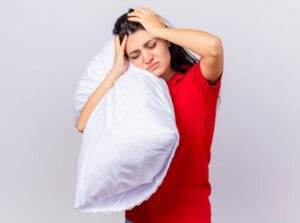The Health Blog

Sleep Solutions for Adults: Natural Approaches
Remember when sleep just… happened? You’d fall into bed, and before you could even think about it, you’d wake up with the sun feeling (mostly) refreshed. Those were the days, right?
Fast forward to adulthood — and suddenly, sleep is a riddle. The body’s tired. The brain is wired. You lie there, staring at the ceiling, replaying that one awkward thing you said in 2013 or mentally drafting an email no one’s asked for.
Sound familiar?
You’re not alone. Adults everywhere are tossing and turning more than before. The reasons are many: stress, screens, hormones, diet, anxiety, and just the weight of being human in a noisy world.
So let’s set aside the pressure. This isn’t about perfection. It’s about finding what works — gently, naturally, and in a way that actually fits into real life. Let’s explore some grounded, realistic strategies for adult sleep improvement — ones that don’t require prescription bottles or rigid routines.
First, Why Sleep Even Becomes a Problem

There’s no single cause. And frankly, that’s part of the problem. Adult sleep issues are usually a mix of habits, hormones, emotional strain, and environmental triggers. It’s not just one thing keeping you up — it’s a pile-up.
Here are a few usual suspects:
- Stress or overthinking at bedtime
- Screen time and artificial light delaying melatonin
- Inconsistent routines and erratic sleep/wake times
- Caffeine or alcohol messing with sleep quality
- Lack of movement or exposure to natural light
- Underlying health issues like pain, menopause, or sleep apnea
Once sleep goes sideways, it’s easy to fall into the trap of trying too hard — worrying about sleep, dreading bedtime, overcomplicating the fix. So instead, let’s return to simplicity. Let’s rebuild trust with the body, step by step.
1. Respect the Power of Rhythm
Our bodies love rhythm — even if our schedules don’t. One of the most effective natural sleep tips for adults is also the most overlooked: a consistent sleep and wake time.
Even on weekends. Even after a bad night.
Why it works: Your internal clock (aka circadian rhythm) thrives on predictability. When you go to bed and wake up at roughly the same time every day, your body starts doing the heavy lifting for you. Melatonin release, body temperature changes, and energy dips all fall into line.
Try this:
- Pick a wake time you can stick to (yes, even if you’re tired).
- Build your bedtime around that — not around when you “feel tired.”
- Stick with it for 7–10 days. Let your body relearn the pattern.
No need to be militant — give yourself grace. But consistency, even loosely followed, brings serious results.
2. Rethink the Role of Light
Here’s something most people don’t realise: light is the strongest regulator of your sleep cycle.
Your brain interprets light as “daytime” and darkness as “sleep time.” But in a world of LED bulbs, 24/7 screen access, and scrolling in bed, the brain never really gets the message.
That’s a problem.
So one of the simplest insomnia remedies for adults? Control your light exposure.
Morning:
- Get natural light as early as possible. Go outside. Sit by a window.
- This early light boosts cortisol (the good kind) and helps you wake up fully.
Evening:
- Dim the lights about 1–2 hours before bed.
- Use warm-tone lamps, salt lights, or candles.
- Turn off screens at least 30–60 minutes before bed — or use blue light filters if you must scroll.
This one shift — controlling light — resets your body’s natural melatonin production. And that hormone? It’s your sleep MVP.
3. Wind Down Before You Lie Down
You can’t go from 100 to 0 in five minutes. The brain doesn’t work that way. If you’re answering emails or watching thrillers right before bed, don’t be surprised when sleep feels distant.
A wind-down routine acts like a signal. It tells your body: “We’re transitioning now. Time to slow down.”
This doesn’t have to be elaborate. You don’t need a 10-step ritual with oils and chants (unless that’s your thing — then go for it). It can be simple. Intentional. Quiet.
Ideas to try:
- Take a warm shower or bath
- Read something light (paper, not screens)
- Stretch or do gentle yoga
- Sip herbal tea (like chamomile or lemon balm)
- Journal your thoughts or gratitude
- Listen to calming music or white noise
Do one or two of these every night. The key is repetition. Your brain starts to associate these actions with sleep. Over time, it responds faster.
4. Move Your Body (At the Right Time)
It’s hard to sleep well if your body feels stagnant. Regular movement helps balance hormones, reduce stress, and regulate energy levels — all of which support better sleep.
But timing matters.
- Morning or afternoon exercise helps build sleep pressure — the natural urge to sleep after a full day of activity.
- Evening workouts, especially intense ones, can be stimulating. Try to wrap them up at least two hours before bedtime.
You don’t need a gym membership or a 90-minute routine. A walk after dinner, some stretching, or dancing in your kitchen counts.
Just move. Let your body burn off what it’s been holding.
5. Watch What You Eat (and When)

Food and drink choices directly impact your sleep. Some are helpful. Others? Not so much.
Things to avoid close to bedtime:
- Caffeine (yes, even that afternoon coffee)
- Alcohol (it might make you sleepy, but it disrupts deep sleep)
- Heavy, spicy, or rich meals
- Sugary snacks
Sleep-friendly options:
- A banana with almond butter
- Oats or whole grain toast
- A handful of walnuts
- Warm milk (dairy or non-dairy) with turmeric or honey
Eating too late keeps your body focused on digestion, not rest. Aim to finish your last meal 2–3 hours before bed.
6. Create a Bedroom That Works for You, Not Against You
Your sleep environment can either support or sabotage your rest. Think of your bedroom like a cave: cool, dark, and quiet.
Quick tips:
- Keep the room temperature between 60–67°F (15–19°C)
- Use blackout curtains or a sleep mask
- Block out noise with earplugs, a white noise machine, or even a fan
- Declutter. A chaotic room can lead to a chaotic mind.
- Invest in a comfortable mattress and breathable bedding
This isn’t about being fancy — it’s about removing the friction between you and rest.
7. Give the Mind a Place to Rest

Here’s where it gets real: many adults struggle with racing thoughts. You get quiet, and suddenly your brain hands you a highlight reel of worries, to-do lists, and awkward memories.
Instead of trying to “clear your mind” (which rarely works), try redirecting it gently.
Techniques to try:
- Box breathing: Inhale for 4, hold for 4, exhale for 4, hold for 4
- Body scans: Focus on relaxing each part of your body from toes to head
- Guided meditations: Apps like Insight Timer, Calm, or YouTube are great
- Write it out: Keep a notepad beside your bed. Dump your thoughts. Close the book.
Your thoughts aren’t the enemy. They just need somewhere to land before you can fully let go.
8. Consider Gentle Natural Aids — Wisely
Sometimes, the body needs a nudge. Not a shove. If you’ve tried the lifestyle shifts and still need a little help, there are natural options worth exploring.
Common gentle aids:
- Magnesium glycinate – calms the nervous system
- Melatonin (low dose: 0.3–1mg) – helps reset the body clock
- Valerian root, passionflower, or lemon balm – herbal sedatives
- L-theanine – an amino acid that reduces anxiety and promotes relaxation
Start low. Use these occasionally, not nightly. And always check with a healthcare provider — especially if you’re on medications.
Supplements should support your sleep routine, not become the routine.
When to Seek Extra Help
If sleep struggles persist for weeks or months, it’s okay — and smart — to seek professional help. Sleep clinics, CBT-I therapists, and general practitioners can provide valuable support and insights.
Chronic insomnia isn’t something you need to “power through.” There’s help. There are solutions. And you deserve restful nights, just like anyone else.
Sleep Isn’t a Luxury — It’s a Lifeline
Sleep doesn’t always come easy. But it’s not a mystery either.
It’s a rhythm. A relationship. Something to be rebuilt with patience, trust, and kindness — not punishment or perfection.
Whether you’re dealing with a few restless nights or a long-standing sleep struggle, remember: your body wants to rest. It just needs the right conditions.
Start small. Choose one or two of these natural sleep tips. Try them for a week. Then add another. Let sleep return — not through pressure, but through presence.









